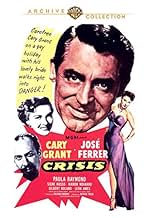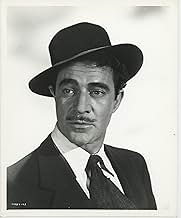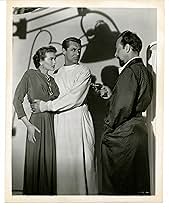AVALIAÇÃO DA IMDb
6,7/10
2 mil
SUA AVALIAÇÃO
Adicionar um enredo no seu idiomaWhile on vacation in a Latin American country, an American neurosurgeon and his wife become tangled in a revolutionary uprising against a tyrannical dictator.While on vacation in a Latin American country, an American neurosurgeon and his wife become tangled in a revolutionary uprising against a tyrannical dictator.While on vacation in a Latin American country, an American neurosurgeon and his wife become tangled in a revolutionary uprising against a tyrannical dictator.
- Direção
- Roteiristas
- Artistas
- Prêmios
- 1 vitória no total
José Ferrer
- Raoul Farrago
- (as Jose Ferrer)
Lillian Adams
- Nurse
- (não creditado)
Carlos Barbe
- Friend of Farrago
- (não creditado)
Orlando Beltran
- Doctor's Assistant
- (não creditado)
Audrey Betz
- Servant
- (não creditado)
George Brady
- Student
- (não creditado)
Robert Cabal
- Very Young Man
- (não creditado)
Andy Carillo
- Man at Table
- (não creditado)
Bridget Carr
- Guest
- (não creditado)
Teresa Celli
- Rosa Aldana
- (não creditado)
Carlos Conde
- Man
- (não creditado)
Rita Conde
- Pretty Woman
- (não creditado)
- Direção
- Roteiristas
- Elenco e equipe completos
- Produção, bilheteria e muito mais no IMDbPro
Avaliações em destaque
Crisis represents yet another attempt by Cary Grant to break away from his light leading man image and do something with more drama. His last attempt was None But the Lonely Heart which got great critical notices, an Oscar nomination for him and died at the box office. The public just didn't want to see him in stuff like Crisis.
The film is one of a very few non-musical productions by Arthur Freed at MGM. And the original story was intended for Spencer Tracy who was to be a neurosurgeon traveling in Latin America with a 10 year old daughter. The powers that be decided a little romance was needed so Tracy was substituted by Grant and he was given a wife played by Paula Raymond instead of a daughter.
He's a neurosurgeon and when the powers that be discover him in their country he's brought to the presidential palace to operate on Peron like dictator Jose Ferrer. Then the rebels capture Paula Raymond and Grant's got a dilemma.
Signe Hasso who was cast in the role of the first lady bears more than a passing resemblance to Eva Peron does the best job in the film. Cast in Latino parts are such Hollywood Latinos as Raymond Novarro, Gilbert Roland, Antonio Moreno, and Pedro deCordoba. All perform well.
Crisis marked Richard Brooks's directorial debut and he wrote the script as well. Unfortunately the same thing happened here as did to None But the Lonely Heart. Great reviews and it lost money. Brooks was established as a director though.
The film is one of a very few non-musical productions by Arthur Freed at MGM. And the original story was intended for Spencer Tracy who was to be a neurosurgeon traveling in Latin America with a 10 year old daughter. The powers that be decided a little romance was needed so Tracy was substituted by Grant and he was given a wife played by Paula Raymond instead of a daughter.
He's a neurosurgeon and when the powers that be discover him in their country he's brought to the presidential palace to operate on Peron like dictator Jose Ferrer. Then the rebels capture Paula Raymond and Grant's got a dilemma.
Signe Hasso who was cast in the role of the first lady bears more than a passing resemblance to Eva Peron does the best job in the film. Cast in Latino parts are such Hollywood Latinos as Raymond Novarro, Gilbert Roland, Antonio Moreno, and Pedro deCordoba. All perform well.
Crisis marked Richard Brooks's directorial debut and he wrote the script as well. Unfortunately the same thing happened here as did to None But the Lonely Heart. Great reviews and it lost money. Brooks was established as a director though.
"Crisis" is a study in how a strong supporting cast can make a movie complete. While Grant and Ferrer give powerful performances, they are enhanced by even better performances by Signe Hasso and Ramon Navarro. The latter two, with subtle, understated characterizations, round out a thoughtful script and cast. The story is compelling -- medical/ethical conflict, interwoven with a political drama which doesn't attempt to sway. It does provide a backdrop which doesn't interfere but enhances.
Most IMDb critics claim that this is unlike any other Cary Grant role, but I think his performance is remarkably reminiscent of "Notorious." Agent Devlin was more romantic, to be sure, but Dr. Ferguson is also a cool, calm, rational, and duty-bound man in a political maelstrom: he's a surgeon, vacationing in a banana republic whose tumor-stricken dictator shanghais him. The result is a trenchant dramatic character, which Grant does very well, supported by Ramon Novarro and Gilbert Roland, who always add quality to a movie. And I'd single out two other performers:
The Spanish composer Vicente Gómez graces only one scene, in a café, but he plays a soulful guitar solo that I wanted much, much more of.
And then there's José Ferrer as the dictator. He almost steals every scene, especially when he watches Grant's amateur surgical team drill into a fake human skull, rehearsing for the surgery awaiting the dictator himself tomorrow. When the rehearsal is done, Ferrer is sweating visibly and fumbling with a cigarette. He makes it easy for you to project yourself into that makeshift O. R. with the student surgical team-- you with a brain tumor and a captive surgeon who makes no effort to hide his antipathy.
But Grant holds his own. "Tell them never to use that instrument on the brain again," he says to his translator. "It might suck a piece right out of the brain." Ferrer hears, of course, and through his sweat he asks, "How did it go?" Grant drops the stitched-up skull in a garbage pail and says, "Oh, it went quite well. But you died."
The Spanish composer Vicente Gómez graces only one scene, in a café, but he plays a soulful guitar solo that I wanted much, much more of.
And then there's José Ferrer as the dictator. He almost steals every scene, especially when he watches Grant's amateur surgical team drill into a fake human skull, rehearsing for the surgery awaiting the dictator himself tomorrow. When the rehearsal is done, Ferrer is sweating visibly and fumbling with a cigarette. He makes it easy for you to project yourself into that makeshift O. R. with the student surgical team-- you with a brain tumor and a captive surgeon who makes no effort to hide his antipathy.
But Grant holds his own. "Tell them never to use that instrument on the brain again," he says to his translator. "It might suck a piece right out of the brain." Ferrer hears, of course, and through his sweat he asks, "How did it go?" Grant drops the stitched-up skull in a garbage pail and says, "Oh, it went quite well. But you died."
Even someone who's been keeping track of old movies for many years can be forgiven if this one slipped under the radar. Surgeon Cary Grant and his wife are vacationing in a South- or Central-American paradise when they are abducted by government forces. Seems the country's dictator (Jose Ferrar) has a brain tumor but is afraid to leave the country due to revolutionary activity. Grant is pressured into performing the operation. Only problem is, the guerrillas have captured his wife, threatening to kill her if Ferrar survives the operation. But the letter informing him of this never reaches Grant.... Supporting cast includes Leon Ames, Ramon Navarro (Ben-Hur of the silent era) and Signe Hasso as Ferrar's wife, an Evita Peron clone. This is a tense and often intelligent drama (and slightly out of Grant's usual debonair range) that doesn't merit the obscurity it seems to be buried in.
This is Richard Brooks' first directorial effort. Examining the work half a century after it was made, the film presents a director who knows how to get the most from his actors through the written word and the way it is spoken. Three actors sparkle: Cary Grant, Jose Ferrer, and Signe Hasso.
Compare Cary Grant's acting in the Hitchcock vehicles and in this. Grant presents a maturity in his speech patterns that do not show up under Hitchcock's direction. I think much of the quality of the performances is probably due to the director who took his first film seriously--probably a lot more than he did in his later career.
All in all, this is a curious film--quite unusual in several ways compared to the average Hollywood products in the Fifties. Is it only a question of humanism winning over all evils? Or more?
Compare Cary Grant's acting in the Hitchcock vehicles and in this. Grant presents a maturity in his speech patterns that do not show up under Hitchcock's direction. I think much of the quality of the performances is probably due to the director who took his first film seriously--probably a lot more than he did in his later career.
All in all, this is a curious film--quite unusual in several ways compared to the average Hollywood products in the Fifties. Is it only a question of humanism winning over all evils? Or more?
Você sabia?
- CuriosidadesOriginally banned in Mexico, Central and South America.
- Erros de gravaçãoThe doctor announces his fee is ten percent of the patient's income, but does not say whether this means monthly, annual or some other period.
- Citações
Raoul Farrago: At least permit me to thank you. You have done a great service not only to me but to the people of my country.
Dr. Eugene Norland Ferguson: I only saved your life I didn't vote for you.
Raoul Farrago: Neither did they.
[smiling]
- Cenas durante ou pós-créditosPROLOGUE: "The time is now. The scene of the action is fictitious, but the forces at play in this story are not fictitious."
- Versões alternativasAlso available in a computer colorized version.
- ConexõesReferenced in Secret Publicity - Forbes Taylor Remembers the Making of State Secret (2021)
Principais escolhas
Faça login para avaliar e ver a lista de recomendações personalizadas
- How long is Crisis?Fornecido pela Alexa
Detalhes
Bilheteria
- Orçamento
- US$ 1.616.455 (estimativa)
- Tempo de duração
- 1 h 35 min(95 min)
- Cor
- Proporção
- 1.37 : 1
Contribua para esta página
Sugerir uma alteração ou adicionar conteúdo ausente

































